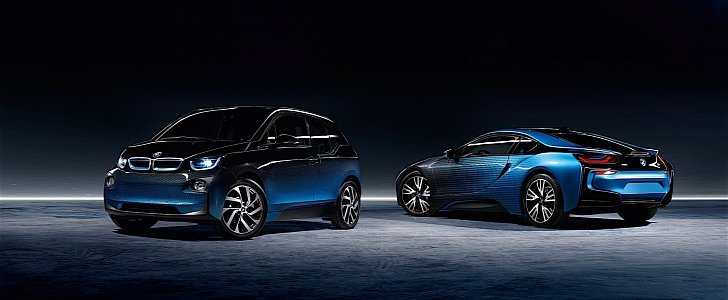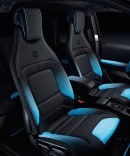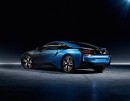There was a time when BMW looked to be one of the most committed European manufacturers in the field of EVs. It was 2011 and the Bavarians were introducing their newly created "i" division.
Just like the more famous "M" one, the new sub-brand was going to deal with special vehicles that couldn't fit with the rest of the lineup. However, the "i" division's task was to create cars that focus on efficiency with the use of alternative powertrains, innovative design solutions, and new, lightweight materials.
A few years later and the first and only two products reared their heads: the i8 hybrid sports car and the i3 battery-powered city car. They were both met with mixed emotions, but while the i8 had both decent performance figures and a low fuel consumption (not to mention it looked stunning), the i3 was a lot less impressive.
So BMW's single EV to date is three years old now, and the company has declared earlier this year that it would switch its focus from electric propulsion to autonomous driving, as it's unable to concentrate on both at the same time.
A few months ago, however, probably spurred by the recent developments at Volkswagen (Audi) and Mercedes-Benz, BMW came out and promised an electric X3-sized SUV and a MINI model over the next few years. The previous statements were completely ignored, so everyone imagined they were just a case of miscommunication on the brand's part.
According to Bloomberg, his main complaint during a journalists briefing held at a BMW testing facility revolved around the current limitations in battery capacity. He says it would take at least seven years for the energy density to double, which isn't such a gloomy forecast if you ask us.
At the same time, BMW is investing in a network of ultra-fast chargers around Europe, a project it is co-developing with Daimler, Ford, and Volkswagen AG. With a planned output of up to 350 kW, these stations could even remove the need for large capacity batteries and the subsequent range improvement, as a recharge would take no more than 10 or 15 minutes.
Another BMW official, its CFO, Friedrich Eichiner, had a different take on the EV market. Probably basing his opinion strictly on the experience of the German brand, he said that “[BMW has] learned that people aren’t prepared to pay a higher price for an electric vehicle. I don’t see some kind of disruptive element coming from electric cars that would prompt sales to go up quickly in the next five to six years.”
Translating what these BMW high-ranking officers are trying to say, we've come up with this conclusion: the German carmaker is going to keep building EVs, not because it believes in them at this moment, but it doesn't want to be left behind. Also, the Bavarians are somewhat in denial when it comes to Tesla's success, and keep hiding behind the high asking price to explain their electric model's failure.
A few years later and the first and only two products reared their heads: the i8 hybrid sports car and the i3 battery-powered city car. They were both met with mixed emotions, but while the i8 had both decent performance figures and a low fuel consumption (not to mention it looked stunning), the i3 was a lot less impressive.
So BMW's single EV to date is three years old now, and the company has declared earlier this year that it would switch its focus from electric propulsion to autonomous driving, as it's unable to concentrate on both at the same time.
A few months ago, however, probably spurred by the recent developments at Volkswagen (Audi) and Mercedes-Benz, BMW came out and promised an electric X3-sized SUV and a MINI model over the next few years. The previous statements were completely ignored, so everyone imagined they were just a case of miscommunication on the brand's part.
But wait, there's more
Now, though, Stefan Juraschek, Vice President of Electric-Powertrain Development for the Bavarians, decries the difficulty of building battery-powered cars and says manufacturers have to "walk through the valley of tears" if they want to come up with a way of making EVs more profitable.According to Bloomberg, his main complaint during a journalists briefing held at a BMW testing facility revolved around the current limitations in battery capacity. He says it would take at least seven years for the energy density to double, which isn't such a gloomy forecast if you ask us.
At the same time, BMW is investing in a network of ultra-fast chargers around Europe, a project it is co-developing with Daimler, Ford, and Volkswagen AG. With a planned output of up to 350 kW, these stations could even remove the need for large capacity batteries and the subsequent range improvement, as a recharge would take no more than 10 or 15 minutes.
Another BMW official, its CFO, Friedrich Eichiner, had a different take on the EV market. Probably basing his opinion strictly on the experience of the German brand, he said that “[BMW has] learned that people aren’t prepared to pay a higher price for an electric vehicle. I don’t see some kind of disruptive element coming from electric cars that would prompt sales to go up quickly in the next five to six years.”
Translating what these BMW high-ranking officers are trying to say, we've come up with this conclusion: the German carmaker is going to keep building EVs, not because it believes in them at this moment, but it doesn't want to be left behind. Also, the Bavarians are somewhat in denial when it comes to Tesla's success, and keep hiding behind the high asking price to explain their electric model's failure.






















